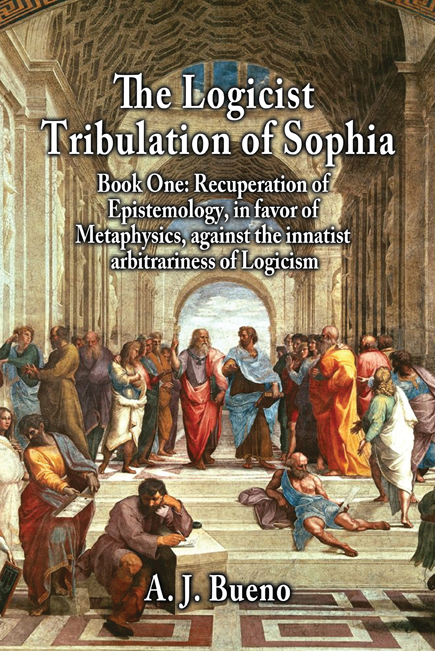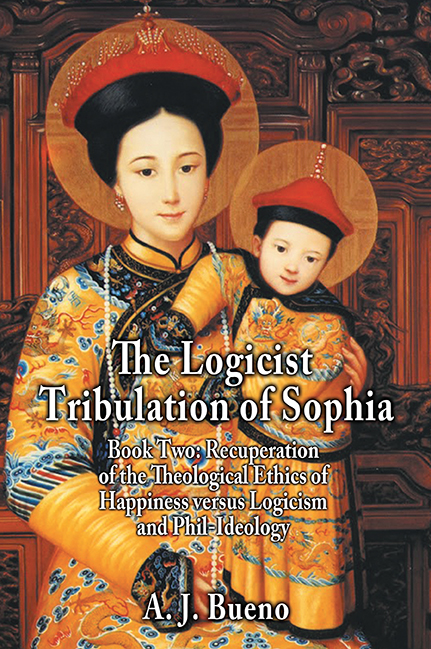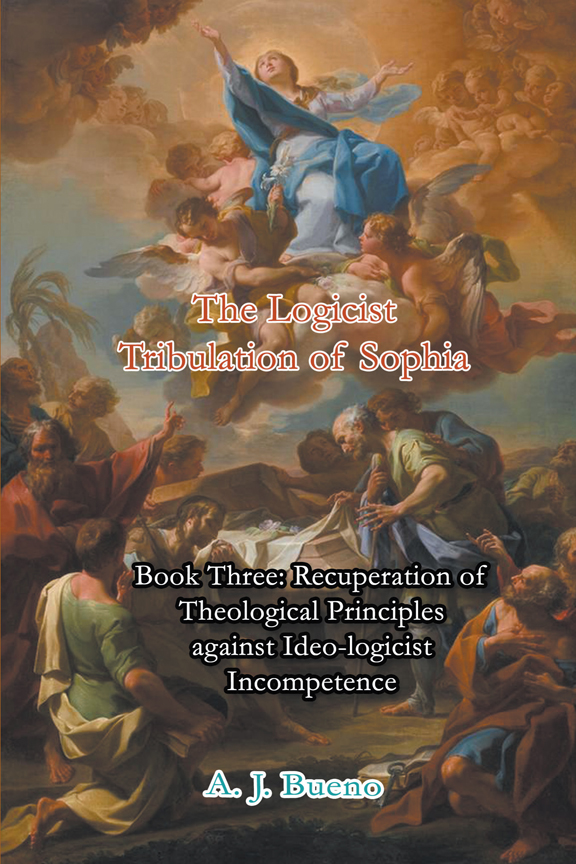The Logicist Tribulation of Sophia

The Logicist Tribulation of Sophia is a trilogy that attempts to confront idealism, positivism, secular humanism, as well as decadent and sterile Thomism. Since the most important parts of Book 1 are the result of the author’s personal interpretation of Thomas Aquinas, the work is unexpectedly original.
Logicism is a kind of animism invested of rationality. Animism is the unscientific tendency of transposing outside the mind interpretations of our cognitive apparatus. In general, all errors in science are related to logicism because they are human errors and, consequently, a product of or related to the way we feel and think.
“Whoever ignores his own cognitive limitation falls into some form of logicism (or animism) for he ends up projecting his own ideas or mental schemes upon reality. Human science is always perfectible. Each new progress frequently uncovers the traces of previous logicism” (Book 1).
The trilogy has unity in spite of its variety and amplitude. The relentless attack against logicism is the spark that kindles the flame of its unaltered leitmotiv and preponderant weapon: epistemology. This aims to foster the development of critical and analytical abilities. Hence the dedication: ERUDIENDIS ABSQUE DOLO SEU FICTIONE IUNIORIBUS PRAECIPUE (to those who are to be taught without fiction or deceit, especially the youth).
Book 1 develops the essentials of an epistemological technique discovered in Aquinas, thus providing a scientific procedure for philosophy. It is the foundational section of the trilogy.
The Logicist Tribulation of Sophia Book Two

Recuperation of the Theological Ethics of Happiness versus Logicism and Phil-Ideology
St. Augustine says there is “no other reason for men to philosophize but to be happy.” Obviously, the Recuperation of the Theological Ethics of Happiness versus Logicism and Phil-Ideology is grounded in Book 1 of this author’s trilogy because, without metaphysics, there are no superior goods, and without the possession of such goods, there is no happiness.
The most original and philosophic parts of this essay are the studies regarding the possibility of a science on happiness, the analysis of love, and the metaphysical study of the law which, in Kant and logicist strands, becomes ultimate reference point for morals.
Epistemology shows that the law is an elaboration integrated by “universal concepts” and, therefore, should not be the ultimate point of reference, supplanting the supreme, singular-personal good.
Love is focused in relation to happiness. Love is not desire but connaturality or adaptation to the good. Equipped with an appropriate notion of love, it is possible to delve into the act of creation and into the need of intellectual creatures to achieve the end of creation.
There is no happiness without rationality and internal freedom. The last third of the book turns more theological, explaining that only under the action of the Spirit can the arduous good be desired, leading to “freedom from the law.” The New Law is the very presence of the Holy Spirit according to Aquinas.
The Logicist Tribulation of Sophia Book 3

This Recuperation, based on the epistemology of Book 1, confronts the logicist destruction in theology. The preface enjoins: “Logicism is deleterious in all sciences. We shall see how it can destroy Theology trying, for example, to replace reality with sacred texts, that is, with testimonies of Revelation.”
The logicist sub-epistemology certainly favors the identification of Revelation with Bible, of faith with articles of faith, of enuntiabilia and concepts with reality. Writing his theological thesis on Bonaventure, J. Ratzinger was pleasantly surprised to discover that no one in the thirteenth century called the Bible the Revelation. But this does not mean that logicism began afterward, with Descartes, for example, reaching its apotheosis with the German idealism.
This book explains how a peculiar symbiosis of nominalism (Ockham) and logicism impairs the sincere and orthodox initial search of Luther, who ends up developing a theology of the nomina-logicist sort source of ravings. Erasmus perceives it and tries to refute him, but is a victim of similar epistemological blunders.
The book’s second part focuses on the issue of the integral education of young people and leads to the need of sacred theology. Is it advisable to teach young people metaphysics and ethics in a strictly philosophical way in order to provide a fundamental view of reality, a Weltanschauung, perhaps?
The explicit answer of Aristotle and Thomas is a resounding no. Aquinas advocates teaching metaphysics within theology.
